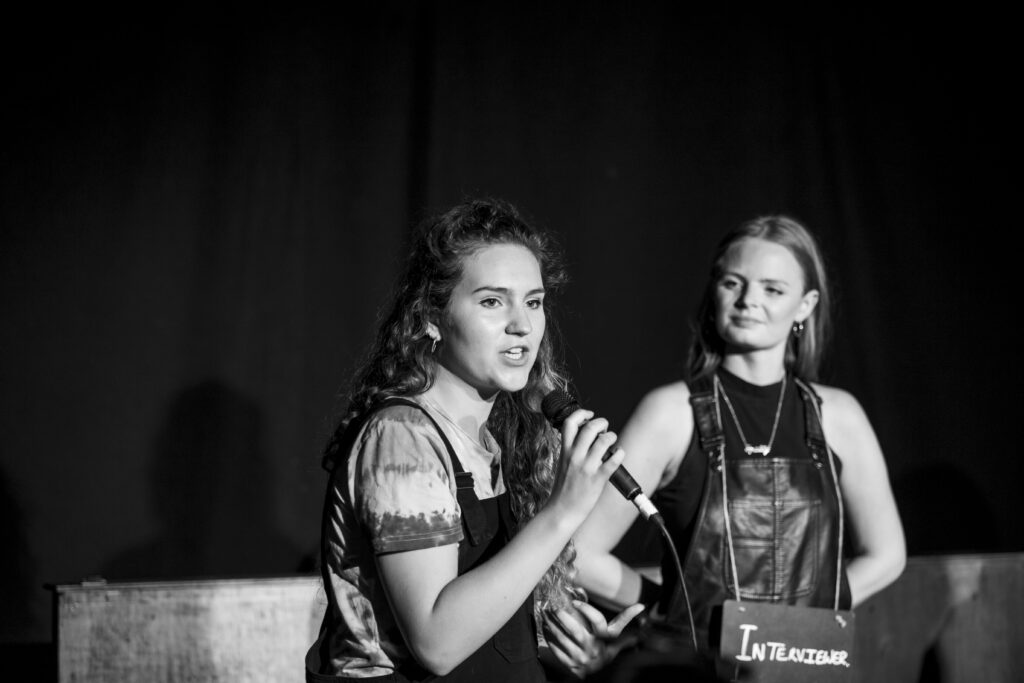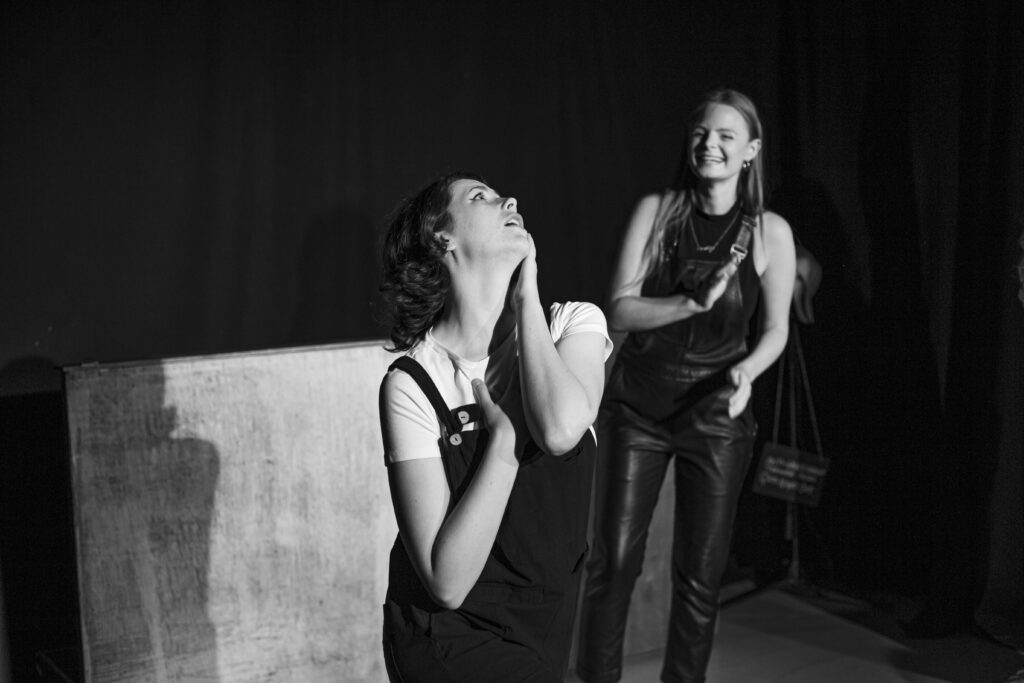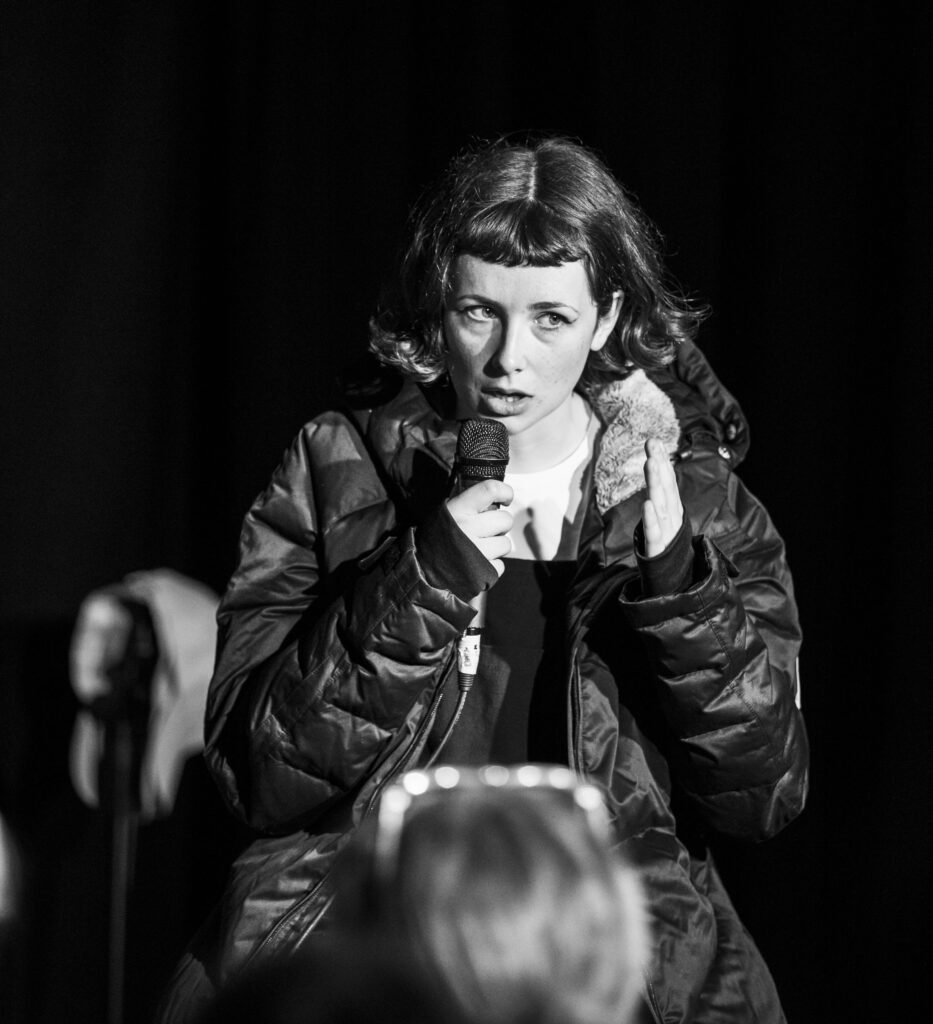In the previous issues of Artist Focus, we’ve mainly been focusing on visual artwork, such as illustrations and photography. However, the creative endeavours that Brighton has to offer as a city don’t stop there. With that in mind, I caught up with the theatre director Maddie Ross, and creator of Girl Code, a female theatre collective that aims to empower women through plays based in real-life experiences. During our interview we discussed her use of verbatim theatre, her understanding of applied activism and her upcoming project “Still Not Getting It”, which will focus on harassment and indecent exposure on Brighton’s beaches during lockdown.
How did you decide to get into theatre?
I studied drama at University, and after finishing, I wasn’t really sure what I wanted to do afterwards. I started applying for director roles, but I was really disappointed when I realised the way men dominated the industry, and that in any of these jobs, I would often be working under a man. I also noticed that a lot of the productions were purely for entertainment value, and just to sell tickets, rather than to carry a message across, and I just didn’t feel passionate about them.
Simultaneously, I was working at a domestic abuse charity, and through doing that, I realised that the stories I was listening to weren’t being shown in the media. So, I took the decision to focus my career around real-life stories told by women.
How was Girl Code born? What was the motive behind it?
I started Girl Code in November 2018 because I wanted to write a play about sexual assault and harassment in nightclubs. That idea was born out of a personal experience. On a night-out, a guy grabbed me, and told me that I was coming home with him. Another man intervened when he realised this guy wasn’t leaving me alone. I was lucky, because I knew what I was dealing with, someone was there to help me, and I knew the language that I needed to use in order to get myself out of this situation. However, that experience made me realised how many women would have ended up going home with him out of fear, and because they might not know what to do. So, I decided to write a play about this, about how we can tackle these situations, and about consent –where the line is, and why we often feel like it’s blurred. That’s how my first play, “Coming Home with Me” was born.
The play follows a group of women during a night-out, and it covers the many experiences that can happen to women in night clubs. For it, I used verbatim theatre, which is a form of documentary theatre that utilises interviews as the source material, and it creates a script purely based on the real-life dialogue. Besides victim testimonials, I also included government debates and big news stories about harassment in night clubs, so the final product was an amalgamation of content; a sort of ‘collage’ without a linear narrative, but with a clear story-line.
My motive as a director is to create material that empowers women and initiates a conversation. The best review I can have after a performance is someone saying “I didn’t stop talking about this for an hour with all of my friends after coming and seeing it.” That’s what I really strive for. I am also hyper-aware of the fact that I am a white, middle-class woman, so using verbatim theatre allows me to create stories from people who wouldn’t normally be able to have their story heard. I don’t think my experience is particularly exciting, so I feel that the content becomes meaningful through the amalgamation of a bunch of stories from different women.

Do you see Girl Code as a form of applied activism?
Absolutely. As I started getting more recognition for my work in the last year, a lot of people have started referring to me as an activist. I wouldn’t say I actively pursued this, but I do agree in the sense that my work can be read as an educational tool. I am also aware that traditional theatre can often be inaccessible so, in terms of promotion, I would prefer to have an audience that don’t usually go to the theatre. Ideally, I want anyone to be able to come see the show, understand it and enjoy it, but more specifically, the audience I always have in mind are women who don’t feel like the theatre world was made for them, or women who don’t know how to start these conversations. And, if a man stumbles into the show, learns a thing or two, and questions himself, amazing, but at the end of the day, I’m not making these plays for men, I’m making them to empower women and to tell their stories.
Even though the main topic of your shows is quite serious, you often utilise a comedic approach. Why is that?
The comedic side actually comes from the women themselves. The way that they talk about their experiences with harassment is deflective and comedic, so I deliberately try to highlight that in my work to inject it with authenticity. Besides, I feel that without comedy, the audience wouldn’t be able to digest some of this stuff –it’s too much. I have always enjoyed working with comedy anyway, and I don’t see the point of making someone sit through an hour of them being told that harassment is bad in a really depressing tone.
I also like playing with genres, and making things surreal. By playing with the space where the characters are, and by putting them into surreal scenarios while they deliver the verbatim dialogue, I am able to create a comedic perspective. A conversation that might not have been funny originally, becomes funny, whilst also keeping the original intent and tone of the message.

Tell me a bit more about your process of writing theatre. How do you manage to translate the emotion and narrative into the visual space of the play?
I play a lot with multimedia projections. In “Coming Home with Me” we had a lot of ‘old school’ waltzes playing in the background, making a point on how people used to dance with each other in the past. We also had media portrayals of women in night clubs. People often underestimate the number of things you can do with light and sound – you can really transform a space. During Fringe, we only had one piece of set: a stage that split into two, the bar and the girl’s toilets. This instantly gave the viewer the sense of being in two different spaces at once. So as a director, it was essential for me to create congruous movement between both spaces. I knew that if I could shape the characters well enough, and make clever use of the sound, then the audience would be able to understand the narrative clearly. For example, we had a blaring pounding sound of bass in the nightclub, and then the sound designer made it sound as if the music was in another room whenever the scene was transported into the toilet. Since I do play with the surreal, and with non-linear narratives, I have to trust my audience to be able to go with me to these places. If your actors believe enough that they are in that space, and you can create it through sound and light too, then it will become apparent to the audience.
Some of the experiences you talk about in your work relate to your personal experience as a woman, which I assume can be a bit overwhelming. So, how do you manage to create a healthy balance between your art and your wellbeing?
Finding the comedic elements I mentioned previously is very important. I am also very lucky because I have a really good system of female support with whom I can discuss the themes openly. Additionally, working in the domestic abuse sector definitely gave me the tools to deal with these topics. Self-care is also essential for me. I’ve learnt when to stop and when to step away from my work; I never do more than four hours of writing on this because it just consumes me otherwise. The main thing however, is that the passion I have for the topic means that I can often overwrite the negative connotations around the topic –it’s sort of cathartic in a way.
Practically speaking, I also work alongside the charity Survivors Network, who have been a great support in all my projects, and I’ve also done safe-guarding training. Additionally, with casting, I always make sure that the people I choose are aware of the nature of the play, and that I’m not bringing anyone into the project who might find it triggering or upsetting.
How is your relationship with the rest of the team? Is Girl Code more of a collective project, rather than an individual venture?
It’s very collaborative. I find it very strange and unfair that within the theatre industry, actors are often treated as passive subjects. We tend to assume that the director always has the last say, and that they are the only ones telling the actors what to say or how to say it, but the reality is that actors spend years training to learn how to embody their characters. So, in Girl Code, we spend a lot of time developing the characters as a group. We do interviews with them in character; working out where they went to school, what they studied at University, whether they come from a privileged background or not. All these things allow us to dig deep into who these characters really are, which means that when we’re rehearsing, the actors themselves know how to adapt the text to their character. I don’t like to be controlling in general; I try to create an environment in which the actors can openly tell me if the text needs to be re-adapted.
There are obviously some aspects of the play in which I decide not to change certain things, because in the end the play is my creation, but for the most part it’s a very collaborative process, and I’m always open to hear anyone’s suggestions. For instance, in the latest project, we’ve been working with an animator, and I have just let them run off with their gut. My work is ultimately about empowering female voices, so, it isn’t congruous to be controlling with the female creators. Besides, if it was just my opinion the whole way through, the final result wouldn’t be as special.

What are your aims long term? What do you hope to achieve as a creator?
Next month we’re putting on FemFest again, which is a little festival that we run for International Women’s Day. It’s going to take place between the 8th and the 14th of March. We got ten online acts coming on for it. During the festival, we’ll be releasing the documentary we’ve been working on for the last eight months which is called “Still Not Getting It” and deals with harassment and indecent exposure on Brighton’s beaches during lockdown. This work will combine interviews with the police and with the Survivors Network with testimonials. Long term, we are hoping to project this film in schools, colleges, and also do some Q&As. Since it’s more portable, it might be useful for places that don’t have a lot of funding, but still want to discuss the topic further. We’re also hoping to send it to some documentary festivals.
Long term, I want to keep making work that is relevant, and that makes people relate to the stories shown. I am also working alongside some colleges to do workshops on consent. I want Girl Code to be a community organisation in Brighton, and safe space where women, non-binary and trans people can share, reflect and show their experiences.
Get tickets for “Still Not Getting It” here.
You can follow Girl Code Theatre and FemFest on Instagram, and check out their website.

